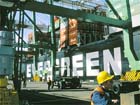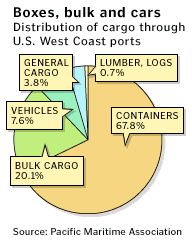
NEW YORK (CNN/Money) -
Labor negotiations are set to start Monday seeking to avert a July 1 work stoppage that could choke off much of the trade between the United States and Asia.
The talks are between the International Longshore and Warehouse Union and the Pacific Maritime Association, the management group that represents shipping lines and port terminal operators in California, Oregon and Washington state.
A work stoppage could cost an estimated $1 billion a day to the U.S. economy and virtually stop the movement of ships other than oil tankers calling on the U.S. West Coast. Other North American ports would be unable to handle the containers of goods and automobiles that now move across the West Coast docks, meaning that trade between the United States and many major trading partners would be virtually halted.
Work rules, technology key to talks
Management isn't seeking wage concessions, despite average annual pay ranging between about $83,000 and $157,000 last year for about 10,500 union members, depending upon their job classes. But the PMA is seeking changes in work rules that management argues is crucial for the ports to be able to handle expected doubling in ocean shipments between Asia and the United States over the next seven-to-ten years.

In past talks, the shipping line customers have pushed management to reach any kind of settlement to keep the cargo moving across the docks. But this time, groups representing the nation's major retailers and manufacturers are saying they support PMA efforts to win work rule changes, even if the cost is a crippling work stoppage.
"The ports can't continue to operate the way they've been operating the last 50 years," said Jon Gold, director of trade policy for the International Mass Retail Association, which represents retailers, manufacturers, and their suppliers. "With the increase in trade, they have to be more productive. With outdated work rules, that's not going to happen."
Among the types of work now being done by union members is manually keying information about shipments into the computer even though the same information could easily be transferred electronically from other computer systems.
Management prepares for first lockout
The PMA has obtained a $200 million line of credit and is threatening to lock out the ILWU for the first time in history if the union attempts the kind of slowdown that management says it inflicted following the last two contract expirations in 1996 and 1999.

"In '99 it was very plain to us that the union strategy was to run out the clock without an agreement and conduct slowdowns," said Jack Suite, director contract administration for the PMA. "I think it was a successful tactic. They inflict damage on us and they continue to get paid while slowing down work as much as 50 percent. That change in tactic by the union has prompted us to take this stance."
The union insists it never conducted slowdowns and blames management for the more confrontational attitude this time around.
"We've had very cooperative relationship with PMA up until six years ago," said ILWU spokesman Steve Stallone. "There has been an amazing boom in trade between the West Coast and Asia and it was accomplished with relative labor peace, with both employer and union prospering."
Stallone said the union is willing to discuss the greater use of new technology, but that management is trying to use new technology to transfer work to outside contractors in third world countries or right-to-work states.
"We've seen them use technology as a subterfuge to take work away from us," said Stallone. "We have to make distinction what jobs will be lost due to new technology and what jobs will be lost because they use the technology to move the work to other people."
Suite said the expected increases in trade will means that total employment for the ILWU should be increasing in the coming years, but he concedes that an unspecified number of clerks would lose their jobs and might be bumped to the lower paying longshoremen classification.
Few alternatives for ship line customers
Observers say that the two sides seem more serious about a possible work stoppage than at any time in the past.
"It's a little more serious this time around than just pre-negotiating posturing," said Jack Kyser, chief economist for the Los Angeles County Economic Development Corp., pointing to the PMA's line of credit. "It's not just noise. The steamship companies haven't made money for several years. They want more efficiency."
Despite management's lockout threat, Suite and the various trade groups representing ship line customers say they believe that President Bush will step in to order an 80-day cooling off period to keep the cargo moving over the docks.

"The cost of unrest could be enormously detrimental to the budding economic recovery," said Robin Lanier, executive director of the West Coast Waterfront Coalition, which represents major importers and exporters.
But unlike the powers the president has in rail or airline strikes, there is no mechanism for the federal government to impose a contract on the two sides. And Lanier and Gold both worry whether presidential intervention would be effective in the case of a union slowdown.
"You could order these guys back to work, but the question is what kind of productivity you're going to get out of those workers," said Lanier. "Slowdowns can be almost more disruptive than flat-out work stoppages."
Lanier and Gold said that there isn't much that shippers can do in case of a work stoppage.
Some may try to increase shipments in advance of July 1, but they could find limited storage capacity and increased inventory carrying costs making that option difficult or economically unviable.
Most of the containers that carry about two-thirds of the cargo coming through the West Coast ports come on new giant ships that can't fit through the Panama Canal, making rerouting cargo to Gulf Coast or East Coast ports difficult. Union members in those other ports and in Vancouver, British Columbia, might refuse to handle cargo diverted from struck ports. Air cargo would be too expensive for many of the shipments.
"Our members are looking at contingency planning," said Gold. "Unfortunately each comes with their own risk and problems."
Some port customers may try to ride out any work stoppage, hoping that cargo is moving in time for pre-holiday shipments later in the year. But a July work stoppage could cause problems for retailers looking to fill shelves with back-to-school items.

|

